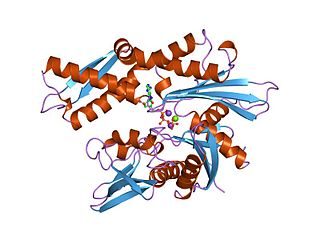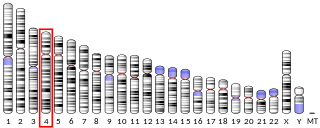Related Research Articles

Chaperone proteins participate in the folding of over half of all mammalian proteins. In molecular biology, molecular chaperones are proteins that assist the conformational folding or unfolding and the assembly or disassembly of other macromolecular structures. Chaperones are present when the macromolecules perform their normal biological functions and have correctly completed the processes of folding and/or assembly. The chaperones are concerned primarily with protein folding. The first protein to be called a chaperone assists the assembly of nucleosomes from folded histones and DNA and such assembly chaperones, especially in the nucleus, are concerned with the assembly of folded subunits into oligomeric structures.
Heat shock proteins (HSP) are a family of proteins that are produced by cells in response to exposure to stressful conditions. They were first described in relation to heat shock, but are now known to also be expressed during other stresses including exposure to cold, UV light and during wound healing or tissue remodeling. Many members of this group perform chaperone functions by stabilizing new proteins to ensure correct folding or by helping to refold proteins that were damaged by the cell stress. This increase in expression is transcriptionally regulated. The dramatic upregulation of the heat shock proteins is a key part of the heat shock response and is induced primarily by heat shock factor (HSF). HSPs are found in virtually all living organisms, from bacteria to humans.

The 70 kilodalton heat shock proteins are a family of conserved ubiquitously expressed heat shock proteins. Proteins with similar structure exist in virtually all living organisms. Intracellularly localized Hsp70s are an important part of the cell's machinery for protein folding, performing chaperoning functions, and helping to protect cells from the adverse effects of physiological stresses. Additionally, membrane-bound Hsp70s have been identified as a potential target for cancer therapies and their extracellularly localized counterparts have been identified as having both membrane-bound and membrane-free structures.

Heat shock 70 kDa protein 8 also known as heat shock cognate 71 kDa protein or Hsc70 or Hsp73 is a heat shock protein that in humans is encoded by the HSPA8 gene on chromosome 11. As a member of the heat shock protein 70 family and a chaperone protein, it facilitates the proper folding of newly translated and misfolded proteins, as well as stabilize or degrade mutant proteins. Its functions contribute to biological processes including signal transduction, apoptosis, autophagy, protein homeostasis, and cell growth and differentiation. It has been associated with an extensive number of cancers, neurodegenerative diseases, cell senescence, and aging.

Heat shock 70 kDa protein 1, also termed Hsp72, is a protein that in humans is encoded by the HSPA1A gene. As a member of the heat shock protein 70 family and a chaperone protein, it facilitates the proper folding of newly translated and misfolded proteins, as well as stabilize or degrade mutant proteins. In addition, Hsp72 also facilitates DNA repair. Its functions contribute to biological processes including signal transduction, apoptosis, protein homeostasis, and cell growth and differentiation. It has been associated with an extensive number of cancers, neurodegenerative diseases, cell senescence and aging, and inflammatory diseases such as Diabetes mellitus type 2 and rheumatoid arthritis.
Heat shock 70kDa protein 1B, also known as HSPA1B, is a human gene. This intronless gene encodes a 70kDa heat shock protein which is a member of the heat shock protein 70 family.

Heat shock factor 1 (HSF1) is a protein that in humans is encoded by the HSF1 gene. HSF1 is highly conserved in eukaryotes and is the primary mediator of transcriptional responses to proteotoxic stress with important roles in non-stress regulation such as development and metabolism.

Heat shock protein HSP 90-beta also called HSP90beta is a protein that in humans is encoded by the HSP90AB1 gene.

Binding immunoglobulin protein (BiP) also known as (GRP-78) or heat shock 70 kDa protein 5 (HSPA5) or (Byun1) is a protein that in humans is encoded by the HSPA5 gene.

Heat shock 70 kDa protein 4 is a protein that in humans is encoded by the HSPA4 gene.

Mitochondrial 70kDa heat shock protein (mtHsp70), also known as mortalin, is a protein that in humans is encoded by the HSPA9 gene.

STUB1 is a human gene that codes for the protein CHIP.

DnaJ homolog subfamily B member 1 is a protein that in humans is encoded by the DNAJB1 gene.

Heat shock 70 kDa protein 1L is a protein that in humans is encoded by the HSPA1L gene on chromosome 6. As a member of the heat shock protein 70 (Hsp70) family and a chaperone protein, it facilitates the proper folding of newly translated and misfolded proteins, as well as stabilize or degrade mutant proteins. Its functions contribute to biological processes including signal transduction, apoptosis, protein homeostasis, and cell growth and differentiation. It has been associated with an extensive number of cancers, neurodegenerative diseases, cell senescence and aging, and Graft-versus-host disease.

Heat shock-related 70 kDa protein 2 is a protein that in humans is encoded by the HSPA2 gene.

Heat shock 70 kDa protein 14 also known as HSP70-like protein 1 or heat shock protein HSP60 is a protein that in humans is encoded by the HSPA14 gene.

Heat shock 70 kDa protein 6 is a protein that in humans is encoded by the HSPA6 gene.

Heat shock 70 kDa protein 4L is a protein that in humans is encoded by the HSPA4L gene.
Heat shock 70kDa protein 7 (HSP70B) also known as HSPA7 is a human gene. The protein encoded by this gene is a member of the Hsp70 family of heat shock proteins.

Heat shock protein family A (Hsp70) member 12B is a protein that in humans is encoded by the HSPA12B gene.
References
- ↑ Han Z, Truong QA, Park S, Breslow JL (February 2003). "Two Hsp70 family members expressed in atherosclerotic lesions". Proc. Natl. Acad. Sci. U.S.A. 100 (3): 1256–61. Bibcode:2003PNAS..100.1256H. doi: 10.1073/pnas.252764399 . PMC 298760 . PMID 12552099.